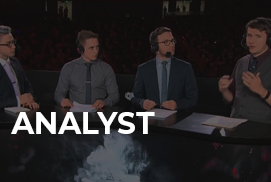

The esports industry is a rapidly growing sector that presents a wide range of career opportunities for professionals. One such career is that of an analyst, who plays a crucial role in evaluating and providing insights on player performance, team strategies, and game trends. In this article, we will discuss the role of an analyst in the esports industry, and how this role can tie into esports.
An esports analyst is responsible for studying game data, analyzing player performance, and providing insights to help teams and players improve their strategies. They collect data from live matches, review game replays, and analyze game statistics to identify patterns, trends, and potential weaknesses in a team’s gameplay. They also provide detailed reports and presentations to coaches, players, and other stakeholders to help them improve their performance.
Analysts in the esports industry can specialize in specific games or genres, such as first-person shooters, MOBAs, or fighting games. They can also work for different types of organizations, including professional esports teams, game publishers, or esports event organizers.
To become an esports analyst, one typically needs a bachelor’s degree in a relevant field, such as computer science, data analytics, or sports management. Some employers may also require a master’s degree or prior experience in data analysis, statistics, or esports.
One way to gain experience as an esports analyst is to volunteer or intern with esports organizations or start as an entry-level analyst role. This can help build a portfolio and network with industry professionals. Analysts may also need to have strong communication and presentation skills, as they often present their findings to teams, coaches, and other stakeholders.
An analyst’s work is crucial in the esports industry, as it provides key insights and recommendations that can help teams and players improve their gameplay and win matches. They help teams identify areas of weakness, develop new strategies, and stay ahead of the competition.
Esports analysts are also in high demand, as the industry continues to grow rapidly. According to a report by Newzoo, the global esports market is expected to generate $1.08 billion in revenue in 2021, with a significant portion going towards talent and player management.
In conclusion, a career as an esports analyst can be both challenging and rewarding. As an analyst, you get to work with cutting-edge technology, use your data analysis and critical thinking skills, and help shape the future of esports. With the continued growth of the esports industry, the demand for talented analysts is only set to increase, making it an exciting time to pursue a career in this field.
